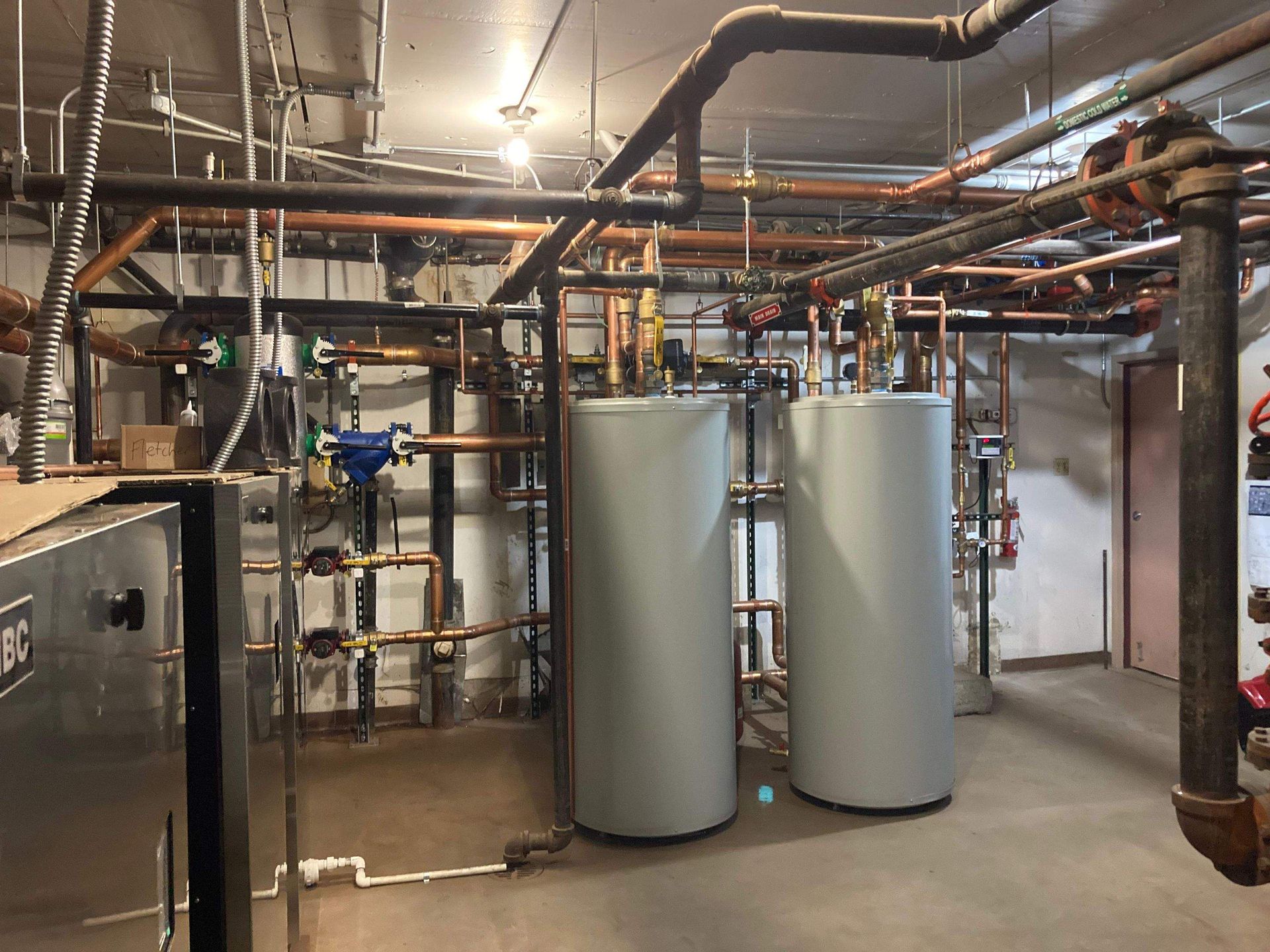Indirect water heater in Denver
Indirect water heaters deliver fast, consistent hot water by using your hydronic boiler as the heat source. Advanced Hydronics designs systems that match household demand with boiler capacity, providing abundant hot water and long service life without the noise, energy loss, or short cycling common to direct-fired or tankless systems.
How an indirect tank works

An indirect water heater uses a heat exchanger inside the tank to transfer energy from the boiler to the domestic water supply. When hot water is needed, the boiler circulates heated water through the coil, warming the tank efficiently and evenly. Once the demand is met, both the boiler and circulator shut off, storing a reserve of hot water without constant firing or energy loss.
Greater Capacity
An indirect tank uses the entire boiler’s BTU output to heat water, which provides significantly faster recovery than most stand-alone gas or electric water heaters. This design ensures steady temperature and consistent flow even during high-demand periods like morning showers or laundry cycles.
Sufficient Storage Volume
Unlike tankless systems that can struggle with simultaneous use, indirect tanks store a ready reserve of hot water sized for your home’s needs. The combination of volume and boiler power supports high-flow fixtures, multi-head showers, and busy households without temperature drops.
High Efficiency
Because the tank draws heat from a high-efficiency boiler, it benefits from long, efficient burn cycles and minimal standby loss. There’s no flue or combustion chamber on the tank itself, which means less heat escapes and more energy goes directly into your water supply.
Longer Tank Life
Indirect water heaters contain no burners, fans, or moving parts, which greatly reduces wear and tear. The indirect design also protects the tank from high-temperature gradients found in direct-fired models, extending lifespan and reducing maintenance over time.
Why Many Choose Hydronics
Hydronic systems bring quiet comfort and dependable hot water with one central plant. For a broader primer on benefits and comparisons, read why choose hydronics to explore the basics.
Benefits of indirect water heaters
- Fast recovery for morning and evening peaks
- Consistent hot water temperature at fixtures
- Energy efficient when paired with a condensing boiler
- Long service life with simple maintenance
- Clean mechanical room layout with fewer standalone appliances
Understanding Indirect Water Heaters
How does an indirect water heater differ from a standard tank?
An indirect water heater uses your boiler as the heat source instead of a built-in burner or electric element. Heat transfers through a coil inside the tank, which allows faster recovery, higher efficiency, and a longer service life than most direct-fired units.
Will my existing boiler work with an indirect tank?
Often yes. We evaluate the boiler’s capacity and controls to ensure it can support both space heating and domestic hot water without affecting comfort. If needed, we update piping or add priority controls so the system runs efficiently and safely.
Do indirect water heaters provide unlimited hot water?
They offer far greater capacity than standard or tankless systems because the entire boiler output is available for water heating. While technically not unlimited, the recovery rate is high enough to keep up with heavy household use and back-to-back showers.
How energy efficient are indirect systems?
Very efficient. Because they rely on your boiler’s high-efficiency operation and long run cycles, indirect tanks waste less energy. They also have minimal standby losses since there’s no flue, burner, or constant pilot light.
How long does an indirect water heater last?
With proper maintenance, most indirect tanks last 15 to 20 years or more. Their simple design—with no moving parts or flame exposure—reduces wear and extends service life compared to typical tank or tankless systems.
What maintenance is required?
Maintenance is minimal but important. Annual service includes verifying temperature controls, checking for sediment buildup, and inspecting the circulator and mixing valves. Keeping water chemistry balanced helps prevent corrosion and scaling for long-term reliability.
